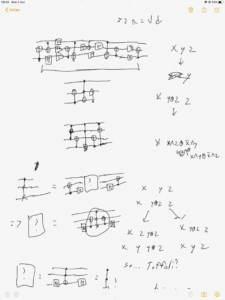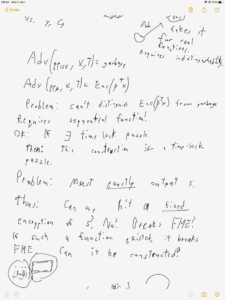Profile
Sam Jaques
Curriculum Vitae
-
Education:
University of Regina (Canada) for a bachelor of science in biology, then again for a degree maths. Then the university of Waterloo (Canada) for a masters in maths, then the university of Oxford for a PhD, in materials oddly enough
-
Work History:
Studied biology at university and worked "in the field" over summers; then I did paperwork at a medical clinic; then I was unemployed until I started my maths degree, and I'm still a maths student
-
Current Job:
PhD Student
-
Employer
The University of Oxford.
-
About Me
Canadian PhD student in Oxford who likes to learn new things.
-
Read more
I live in Oxford with my wife Tiffany. I like to watch youtube videos talking about movies (sometimes more than watching movies themselves!), to go for walks, and to experiment cooking with lots of spices (it’s much more humid here than where I grew up, so everything has more flavour). I used to do parkour before the lockdown, and I have strong opinions about lightbulbs. My pronouns are he/him.
-
How I Use Maths In My Job:
How hard is it to factor a number into primes? If a number has twice as many digits, is it twice as hard to factor, or much harder to factor?
For computers today, it is much more than twice as hard. So a lot of computer security relies on numbers that are so big and so hard to factor that hackers can’t do it. I’m interested in quantum computers, which haven’t been built yet, but should be able to factor numbers very fast.
To answer questions about computers that don’t exist, I need to use a lot of algebra and probability. I can write an equation to represent the computer, then use algebraic rules to figure out what happens to it. Sometimes this leads to a question of probability. For example, given a description of a computer program intended to attack some other computer system, what is the probability that it will succeed? Or, how many times will it need to run before it will succeed?
-
My Work
How hard is it for computers to break the security of other computers?
-
Read more
Computer security today relies on mathematical problems that we believe other computers will need billions of years to solve. However, quantum computers (devices that use quantum physics to compute things in a totally new way), once they are built, will be able to solve these problems very quickly. So mathematicians who work on computer security (“cryptographers”) found new mathematical problems that seem like they will be hard even for quantum computers to solve. My work focuses on how hard these new problems will be. This ranges from questions in physics (e.g.: how fast will heat enter the quantum computer and ruin the computation, and how can we stop that?) to computer science (e.g.: what kind of program can the shortest path in a network?) to number theory (e.g.: how many prime numbers are there such that they are exactly 1 more than a product of a lot of very small numbers?).
-
My Typical Day
Reading, thinking, writing, and talking about maths
-
Read more
My day splits into mainly these things:
- Reading. Since lots of other mathematicians work in this area, I don’t want to spend a lot of time trying to solve a problem someone else already solved. So I have to read a lot to keep up with what other people are doing. Also, sometimes other mathematicians propose new ideas to make computers secure, so I read those ideas to see if I can find any weaknesses.
- Thinking. How does a certain proof actually work? Can I extend the idea? Does a certain algorithm make a computer system vulnerable to attack? I think about these ideas and use maths methods to analyse them. I used to fill up many sheets of paper with these notes, but now I use a tablet (I attached some pictures of this).



- Coding. Ultimately, I want precise answers about the difficulty of running an algorithm. If I try to add up all the steps by hand, it will take forever and I will make mistakes. So I write computer programs to do this for me.
- Writing. If I have any good ideas, I write them up into a report (we just call these “papers”) that I publish online, where (hopefully) other mathematicians will read the ideas and use them.
- Talking. Lots of people around the world are interested in the same problems as I am, so we get together to work on them. Nowadays, this means we call each other on a video chat and discuss the ideas we had or the problems we ran into.
-
My Interview
-
What or who inspired you to follow your career?
Learning about the Enigma machine, which led to an online course on cryptography
What's your favourite use for maths in everyday life?
Spreadsheets! I like to keep track of all kinds of things about my life and use statistics to notice patterns.
What did you think about Maths when you were in school?
Interesting but tedious
What did you want to be after you left school?
A film director
Were you ever in trouble at school?
Sometimes, but I usually followed the rules
If you weren't doing this job, what would you choose instead?
There are so many jobs with maths and computers and I would probably be happy with any of them
Who is your favourite singer or band?
Muse
What is the most fun thing you've done?
Training parkour in Paris
If you had 3 wishes for yourself what would they be? - be honest!
1) I wish I had more energy; 2) I wish I had enough money that I didn't have to work and could just do maths for fun; 3) infinite wishes :)
-
